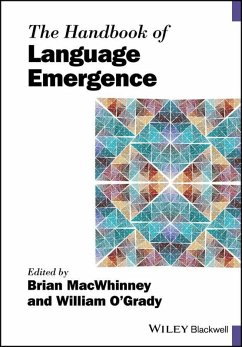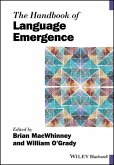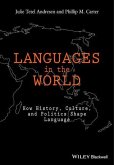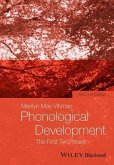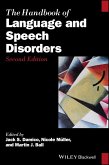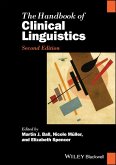The Handbook of Language Emergence (eBook, ePUB)
Redaktion: Macwhinney, Brian; O'Grady, William
53,99 €
53,99 €
inkl. MwSt.
Sofort per Download lieferbar

0 °P sammeln
53,99 €
Als Download kaufen

53,99 €
inkl. MwSt.
Sofort per Download lieferbar

0 °P sammeln
Jetzt verschenken
Alle Infos zum eBook verschenken
53,99 €
inkl. MwSt.
Sofort per Download lieferbar
Alle Infos zum eBook verschenken

0 °P sammeln
The Handbook of Language Emergence (eBook, ePUB)
Redaktion: Macwhinney, Brian; O'Grady, William
- Format: ePub
- Merkliste
- Auf die Merkliste
- Bewerten Bewerten
- Teilen
- Produkt teilen
- Produkterinnerung
- Produkterinnerung

Bitte loggen Sie sich zunächst in Ihr Kundenkonto ein oder registrieren Sie sich bei
bücher.de, um das eBook-Abo tolino select nutzen zu können.
Hier können Sie sich einloggen
Hier können Sie sich einloggen
Sie sind bereits eingeloggt. Klicken Sie auf 2. tolino select Abo, um fortzufahren.

Bitte loggen Sie sich zunächst in Ihr Kundenkonto ein oder registrieren Sie sich bei bücher.de, um das eBook-Abo tolino select nutzen zu können.
This authoritative handbook explores the latest integrated theory for understanding human language, offering the most inclusive text yet published on the rapidly evolving emergentist paradigm.
Brings together an international team of contributors, including the most prominent advocates of linguistic emergentism | Focuses on the ways in which the learning, processing, and structure of language emerge from a competing set of cognitive, communicative, and biological constraints | Examines forces on widely divergent timescales, from instantaneous neurolinguistic processing to historical…mehr
- Geräte: eReader
- mit Kopierschutz
- eBook Hilfe
- Größe: 5.8MB
Andere Kunden interessierten sich auch für
![The Handbook of Language Emergence (eBook, PDF) The Handbook of Language Emergence (eBook, PDF)]() The Handbook of Language Emergence (eBook, PDF)53,99 €
The Handbook of Language Emergence (eBook, PDF)53,99 €![Languages In The World (eBook, ePUB) Languages In The World (eBook, ePUB)]() Julie Tetel AndresenLanguages In The World (eBook, ePUB)36,99 €
Julie Tetel AndresenLanguages In The World (eBook, ePUB)36,99 €![Social Semiotics for a Complex World (eBook, ePUB) Social Semiotics for a Complex World (eBook, ePUB)]() Bob HodgeSocial Semiotics for a Complex World (eBook, ePUB)17,99 €
Bob HodgeSocial Semiotics for a Complex World (eBook, ePUB)17,99 €![Research Methods in Child Language (eBook, ePUB) Research Methods in Child Language (eBook, ePUB)]() Research Methods in Child Language (eBook, ePUB)35,99 €
Research Methods in Child Language (eBook, ePUB)35,99 €![Phonological Development (eBook, ePUB) Phonological Development (eBook, ePUB)]() Marilyn May VihmanPhonological Development (eBook, ePUB)45,99 €
Marilyn May VihmanPhonological Development (eBook, ePUB)45,99 €![The Handbook of Language and Speech Disorders (eBook, ePUB) The Handbook of Language and Speech Disorders (eBook, ePUB)]() The Handbook of Language and Speech Disorders (eBook, ePUB)153,99 €
The Handbook of Language and Speech Disorders (eBook, ePUB)153,99 €![The Handbook of Clinical Linguistics (eBook, ePUB) The Handbook of Clinical Linguistics (eBook, ePUB)]() The Handbook of Clinical Linguistics (eBook, ePUB)149,99 €
The Handbook of Clinical Linguistics (eBook, ePUB)149,99 €-
-
-
This authoritative handbook explores the latest integrated theory for understanding human language, offering the most inclusive text yet published on the rapidly evolving emergentist paradigm.
- Brings together an international team of contributors, including the most prominent advocates of linguistic emergentism
- Focuses on the ways in which the learning, processing, and structure of language emerge from a competing set of cognitive, communicative, and biological constraints
- Examines forces on widely divergent timescales, from instantaneous neurolinguistic processing to historical changes and language evolution
- Addresses key theoretical, empirical, and methodological issues, making this handbook the most rigorous examination of emergentist linguistic theory ever
Dieser Download kann aus rechtlichen Gründen nur mit Rechnungsadresse in D ausgeliefert werden.
Produktdetails
- Produktdetails
- Verlag: John Wiley & Sons
- Erscheinungstermin: 23. Dezember 2014
- Englisch
- ISBN-13: 9781118346099
- Artikelnr.: 42121382
- Verlag: John Wiley & Sons
- Erscheinungstermin: 23. Dezember 2014
- Englisch
- ISBN-13: 9781118346099
- Artikelnr.: 42121382
- Herstellerkennzeichnung Die Herstellerinformationen sind derzeit nicht verfügbar.
Brian MacWhinney is Professor of Psychology, Computational Linguistics, and Modern Languages at Carnegie Mellon University. He has published extensively over many decades, and developed the Competition Model of first- and second-language acquisition, processing, and disorders, which shows how language learning emerges from forces operating on lexically-based patterns across divergent timeframes. He is the author of The CHILDES project: Tools for Analyzing Talk, 3rd Edition (2000 and editor of Mechanisms of Language Acquisition (1987) and The Emergence of Language (1999). William O'Grady is Professor of Linguistics at the University of Hawaii. He has undertaken extensive research in syntax and language acquisition, focusing more recently on the importance of processing for an understanding of how language works and how it is acquired. He is the author of numerous volumes including Principles of Grammar and Learning (1987), Syntactic Development (1997), and How Children Learn Language (2005). His book, Syntactic Carpentry (2005), sets out his ideas on the centrality of the processor in language acquisition.
Notes on Contributors vii
Acknowledgments xiii
Introduction: Language Emergence 1
Brian MacWhinney
Part I Basic Language Structures 33
1 The Emergence of Phonological Representation 35
Patricia Donegan
2 Capturing Gradience, Continuous Change, and Quasi-Regularity in Sound,
Word, Phrase, and Meaning 53
James L. McClelland
3 The Emergence of Language Comprehension 81
Maryellen C. MacDonald
4 Anaphora and the Case for Emergentism 100
William O'Grady
5 Morphological Emergence 123
Péter Rácz, Janet B. Pierrehumbert, Jennifer B. Hay, and Viktória Papp
6 Metaphor and Emergentism 147
Zoltán Kövecses
7 Usage-Based Language Learning 163
Nick C. Ellis, Matthew Brook O'Donnell, and Ute Römer
Part II Language Change and Typology 181
8 Emergence at the Cross-Linguistic Level: Attractor Dynamics in Language
Change 183
Joan Bybee and Clay Beckner
9 The Diachronic Genesis of Synchronic Syntax 201
T. Givón
10 Typological Variation and Efficient Processing 215
John A. Hawkins
11 Word Meanings across Languages Support Efficient Communication 237
Terry Regier, Charles Kemp, and Paul Kay
Part III Interactional Structures 265
12 Linguistic Emergence on the Ground: A Variationist Paradigm 267
Shana Poplack and Rena Torres Cacoullos
13 The Emergence of Sociophonetic Structure 292
Paul Foulkes and Jennifer B. Hay
14 An Emergentist Approach to Grammar 314
Paul J. Hopper
15 Common Ground 328
Eve V. Clark
16 The Role of Culture in the Emergence of Language 354
Daniel L. Everett
Part IV Language Learning 377
17 Learnability 379
Alexander Clark
18 Perceptual Development and Statistical Learning 396
Erik Thiessen and Lucy Erickson
19 Language Emergence in Development: A Computational Perspective 415
Stewart M. McCauley, Padraic Monaghan, and Morten H. Christiansen
20 Perception and Production in Phonological Development 437
Marilyn Vihman
21 The Emergence of Gestures 458
Jordan Zlatev
22 A Constructivist Account of Child Language Acquisition 478
Ben Ambridge and Elena Lieven
23 Bilingualism as a Dynamic Process 511
Ping Li
24 Dynamic Systems and Language Development 537
Paul van Geert and Marjolijn Verspoor
Part V Language and the Brain 557
25 Models of Language Production in Aphasia 559
Gary S. Dell and Nathaniel D. Anderson
26 Formulaic Language in an Emergentist Framework 578
Diana Van Lancker Sidtis
27 Language Evolution: An Emergentist Perspective 600
Michael A. Arbib
Index 625
Acknowledgments xiii
Introduction: Language Emergence 1
Brian MacWhinney
Part I Basic Language Structures 33
1 The Emergence of Phonological Representation 35
Patricia Donegan
2 Capturing Gradience, Continuous Change, and Quasi-Regularity in Sound,
Word, Phrase, and Meaning 53
James L. McClelland
3 The Emergence of Language Comprehension 81
Maryellen C. MacDonald
4 Anaphora and the Case for Emergentism 100
William O'Grady
5 Morphological Emergence 123
Péter Rácz, Janet B. Pierrehumbert, Jennifer B. Hay, and Viktória Papp
6 Metaphor and Emergentism 147
Zoltán Kövecses
7 Usage-Based Language Learning 163
Nick C. Ellis, Matthew Brook O'Donnell, and Ute Römer
Part II Language Change and Typology 181
8 Emergence at the Cross-Linguistic Level: Attractor Dynamics in Language
Change 183
Joan Bybee and Clay Beckner
9 The Diachronic Genesis of Synchronic Syntax 201
T. Givón
10 Typological Variation and Efficient Processing 215
John A. Hawkins
11 Word Meanings across Languages Support Efficient Communication 237
Terry Regier, Charles Kemp, and Paul Kay
Part III Interactional Structures 265
12 Linguistic Emergence on the Ground: A Variationist Paradigm 267
Shana Poplack and Rena Torres Cacoullos
13 The Emergence of Sociophonetic Structure 292
Paul Foulkes and Jennifer B. Hay
14 An Emergentist Approach to Grammar 314
Paul J. Hopper
15 Common Ground 328
Eve V. Clark
16 The Role of Culture in the Emergence of Language 354
Daniel L. Everett
Part IV Language Learning 377
17 Learnability 379
Alexander Clark
18 Perceptual Development and Statistical Learning 396
Erik Thiessen and Lucy Erickson
19 Language Emergence in Development: A Computational Perspective 415
Stewart M. McCauley, Padraic Monaghan, and Morten H. Christiansen
20 Perception and Production in Phonological Development 437
Marilyn Vihman
21 The Emergence of Gestures 458
Jordan Zlatev
22 A Constructivist Account of Child Language Acquisition 478
Ben Ambridge and Elena Lieven
23 Bilingualism as a Dynamic Process 511
Ping Li
24 Dynamic Systems and Language Development 537
Paul van Geert and Marjolijn Verspoor
Part V Language and the Brain 557
25 Models of Language Production in Aphasia 559
Gary S. Dell and Nathaniel D. Anderson
26 Formulaic Language in an Emergentist Framework 578
Diana Van Lancker Sidtis
27 Language Evolution: An Emergentist Perspective 600
Michael A. Arbib
Index 625
Notes on Contributors vii
Acknowledgments xiii
Introduction: Language Emergence 1
Brian MacWhinney
Part I Basic Language Structures 33
1 The Emergence of Phonological Representation 35
Patricia Donegan
2 Capturing Gradience, Continuous Change, and Quasi-Regularity in Sound,
Word, Phrase, and Meaning 53
James L. McClelland
3 The Emergence of Language Comprehension 81
Maryellen C. MacDonald
4 Anaphora and the Case for Emergentism 100
William O'Grady
5 Morphological Emergence 123
Péter Rácz, Janet B. Pierrehumbert, Jennifer B. Hay, and Viktória Papp
6 Metaphor and Emergentism 147
Zoltán Kövecses
7 Usage-Based Language Learning 163
Nick C. Ellis, Matthew Brook O'Donnell, and Ute Römer
Part II Language Change and Typology 181
8 Emergence at the Cross-Linguistic Level: Attractor Dynamics in Language
Change 183
Joan Bybee and Clay Beckner
9 The Diachronic Genesis of Synchronic Syntax 201
T. Givón
10 Typological Variation and Efficient Processing 215
John A. Hawkins
11 Word Meanings across Languages Support Efficient Communication 237
Terry Regier, Charles Kemp, and Paul Kay
Part III Interactional Structures 265
12 Linguistic Emergence on the Ground: A Variationist Paradigm 267
Shana Poplack and Rena Torres Cacoullos
13 The Emergence of Sociophonetic Structure 292
Paul Foulkes and Jennifer B. Hay
14 An Emergentist Approach to Grammar 314
Paul J. Hopper
15 Common Ground 328
Eve V. Clark
16 The Role of Culture in the Emergence of Language 354
Daniel L. Everett
Part IV Language Learning 377
17 Learnability 379
Alexander Clark
18 Perceptual Development and Statistical Learning 396
Erik Thiessen and Lucy Erickson
19 Language Emergence in Development: A Computational Perspective 415
Stewart M. McCauley, Padraic Monaghan, and Morten H. Christiansen
20 Perception and Production in Phonological Development 437
Marilyn Vihman
21 The Emergence of Gestures 458
Jordan Zlatev
22 A Constructivist Account of Child Language Acquisition 478
Ben Ambridge and Elena Lieven
23 Bilingualism as a Dynamic Process 511
Ping Li
24 Dynamic Systems and Language Development 537
Paul van Geert and Marjolijn Verspoor
Part V Language and the Brain 557
25 Models of Language Production in Aphasia 559
Gary S. Dell and Nathaniel D. Anderson
26 Formulaic Language in an Emergentist Framework 578
Diana Van Lancker Sidtis
27 Language Evolution: An Emergentist Perspective 600
Michael A. Arbib
Index 625
Acknowledgments xiii
Introduction: Language Emergence 1
Brian MacWhinney
Part I Basic Language Structures 33
1 The Emergence of Phonological Representation 35
Patricia Donegan
2 Capturing Gradience, Continuous Change, and Quasi-Regularity in Sound,
Word, Phrase, and Meaning 53
James L. McClelland
3 The Emergence of Language Comprehension 81
Maryellen C. MacDonald
4 Anaphora and the Case for Emergentism 100
William O'Grady
5 Morphological Emergence 123
Péter Rácz, Janet B. Pierrehumbert, Jennifer B. Hay, and Viktória Papp
6 Metaphor and Emergentism 147
Zoltán Kövecses
7 Usage-Based Language Learning 163
Nick C. Ellis, Matthew Brook O'Donnell, and Ute Römer
Part II Language Change and Typology 181
8 Emergence at the Cross-Linguistic Level: Attractor Dynamics in Language
Change 183
Joan Bybee and Clay Beckner
9 The Diachronic Genesis of Synchronic Syntax 201
T. Givón
10 Typological Variation and Efficient Processing 215
John A. Hawkins
11 Word Meanings across Languages Support Efficient Communication 237
Terry Regier, Charles Kemp, and Paul Kay
Part III Interactional Structures 265
12 Linguistic Emergence on the Ground: A Variationist Paradigm 267
Shana Poplack and Rena Torres Cacoullos
13 The Emergence of Sociophonetic Structure 292
Paul Foulkes and Jennifer B. Hay
14 An Emergentist Approach to Grammar 314
Paul J. Hopper
15 Common Ground 328
Eve V. Clark
16 The Role of Culture in the Emergence of Language 354
Daniel L. Everett
Part IV Language Learning 377
17 Learnability 379
Alexander Clark
18 Perceptual Development and Statistical Learning 396
Erik Thiessen and Lucy Erickson
19 Language Emergence in Development: A Computational Perspective 415
Stewart M. McCauley, Padraic Monaghan, and Morten H. Christiansen
20 Perception and Production in Phonological Development 437
Marilyn Vihman
21 The Emergence of Gestures 458
Jordan Zlatev
22 A Constructivist Account of Child Language Acquisition 478
Ben Ambridge and Elena Lieven
23 Bilingualism as a Dynamic Process 511
Ping Li
24 Dynamic Systems and Language Development 537
Paul van Geert and Marjolijn Verspoor
Part V Language and the Brain 557
25 Models of Language Production in Aphasia 559
Gary S. Dell and Nathaniel D. Anderson
26 Formulaic Language in an Emergentist Framework 578
Diana Van Lancker Sidtis
27 Language Evolution: An Emergentist Perspective 600
Michael A. Arbib
Index 625
